Shuma Raha finds out how writers are using social media to produce bestsellers.
Illustration: Uttam Ghosh/Rediff.com
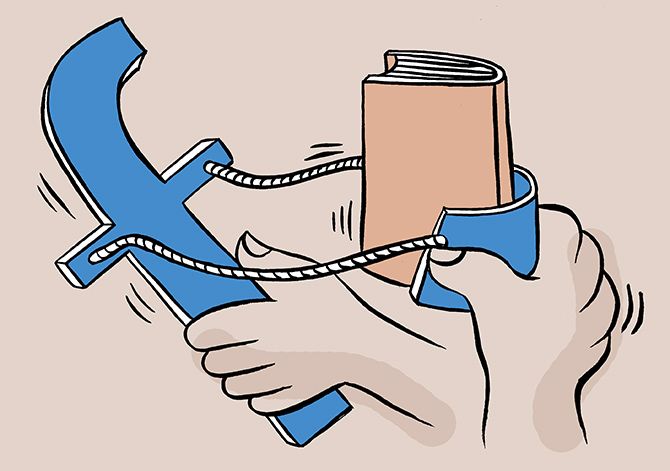
'Each day is your own page and you have the power to write the words on those pages.'
'Don't run away from yourself, your dreams or the life which you deserve.'
Words from some cheesy motivation manual?
Wrong.
These and other inspirational nuggets are strewn across 23-year-old Savi Sharma's debut novel, Everyone Has A Story.
The book, which Sharma self-published and which was later snapped up by Westland because it was zooming up the charts, sold 100,000 copies in 100 days and straddled the Nielsen and Amazon Top 10 bestseller lists for months together last year. (It continues to be at No 9 on Amazon.)
The two-hearts-find-each-other story has also got an astonishing 1,700 plus reviews on Amazon -- surpassed only by such gods of commercial fiction as Chetan Bhagat and Amish.
Sharma is easily India's biggest publishing find of 2016 and is sitting pretty with a three-book deal with Westland.
In February, the Surat-based writer and sometime chartered accountancy student launched her second book, This Is Not Your Story, which she described as a 'story of courage, hope, self-discovery along with love.'
You may not have heard of Sharma yet, but her thousands of young fans, who post ecstatic messages to her on Facebook, are clearly all agog to lap up her latest offering.
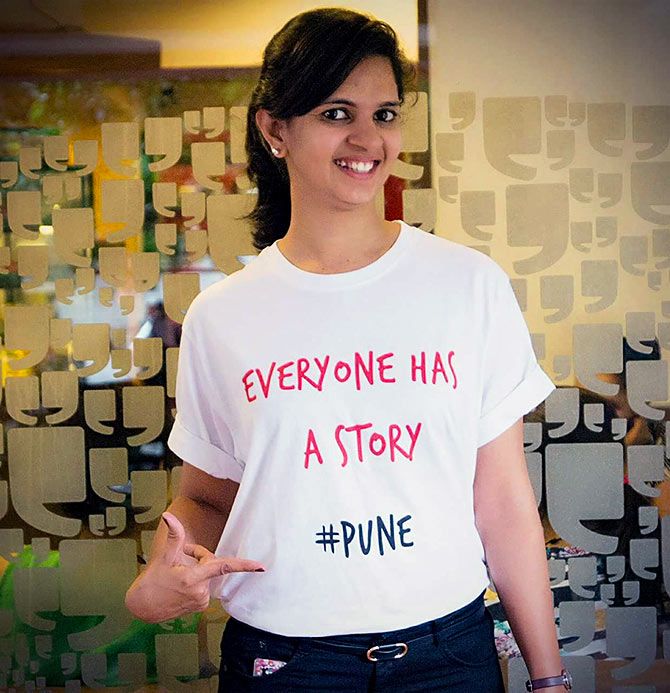
Ajay K Pandey, the other breakout author of 2016 in the mass-market genre, also makes relentless use of social media, especially Facebook, to spread awareness about his books.
A techie with Cognizant in Pune, Pandey's first book, You Are The Best Wife, is the true story of his romance, marriage and the subsequent tragic death of his wife.
Published by Srishti in November 2015, it had a slow start. After Pandey started pushing it on Facebook, sales picked up -- to date, the book has sold about 75,000 copies.
When you consider that anything upwards of 20,000 copies is good to get the bestseller tag for commercial fiction, it's clear that both Pandey and Sharma have vaulted into the big league.
Says Pandey, who has donated the proceeds of his first book to charity and is now doing book tours for his second novel, Her Last Wish: "Writing is one-fourth the battle. Promoting your book, generating word-of-mouth awareness and creating a brand are all-important. Building a fan base is vital."
Sharma and Pandey understand this calculus well.
No doubt their stories clicked with readers, but the massive sales that they managed to rack up in quick time is due in large parts to their savvy social media campaigns to promote their books.
These include Facebook ads, boosted posts (where you pay Facebook to make sure that your target audience gets to see the post), teaser videos, sharing of book images and other creatives, online contests, announcements of giveaways and so on.
Sharma's Facebook page is crammed with notices asking her readers to go book a pre-order copy of her second book, which is signed by her and comes with a booklet of her inspirational quotes.
Pandey's social media profile is somewhat more modest than Sharma's -- the Facebook page of You Are the Best Wife has 91,000 likes.
But, he too, like Sharma, connects with his readers and fans incessantly and replies to all their messages.
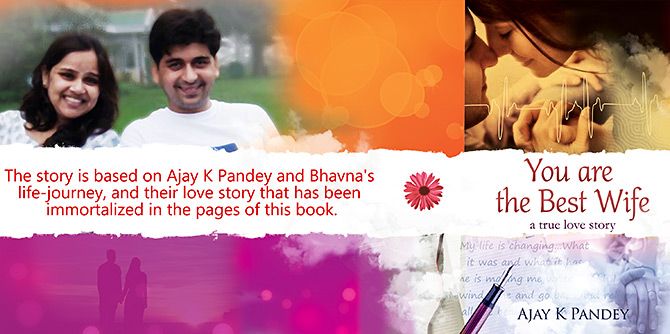
So have these writers cracked the code for achieving bestseller status in a segment that's crowded with thousands of books: Romance, chick-lit, lad-lit, coming of age campus stories and so on?
Remember, commercial fiction, typically priced under Rs 200, is mostly read by aspirational young people, many of them from small cities and towns, who are accessing English books for the first time.
Do debut authors need to be constantly connected with them on social media to break out of anonymity and push sales?
Yes, say publishers and industry insiders.
"That's where the readers, in the 15 to 30 age bracket, are. Facebook, Instagram, Twitter -- that's where they connect with each other," says Penguin Random House India Executive Editor Vaishali Mathur.
Agrees HarperCollins India CEO Ananth Padmanabhan: "The average age of readers of commercial fiction has dropped dramatically. Authors who know their audiences and are able to generate a lot of word-of-mouth publicity on social media are the ones that will break out."
In fact, in the mass market at least, social media buzz for a book trumps reviews in the mainstream media.
Young people trust what their peers are saying about a book online and would rarely read a newspaper review.
Even in the West, an online fan base is sure to turn a first book into a bestseller.
Girls Online, the 2014 novel of fashion blogger and YouTuber Zoella, broke the record for the highest first-week sales of a first-time novelist.
Lily Singh, the Canadian YouTube superstar with over 10 million subscribers, is out with her first book. It's safe to predict that it will be an instant hit among her fans.
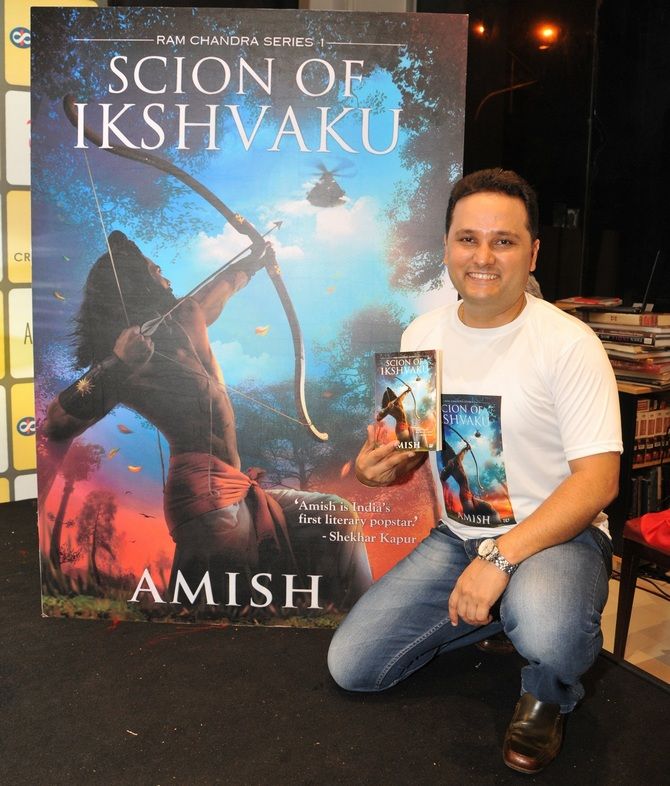
Photograph: Afsar Dayatar/Rediff.com
Of course, every publisher worth her/his salt will tell you that a social media blitz alone will not deliver a mega hit -- at the end of the day, it's the content that matters.
"Unless the readers find the story appealing, no amount of social media marketing will create a bestseller," says Srishti Publishers' Arup Bose.
Srishti has spotted and launched authors like Durjoy Datta, Ravinder Singh and Preeti Shenoy who went on to become big hits in the mass market.
A hurricane of social media marketing for a book does not come cheap.
Estimates vary, but it could cost anything between Rs 5 lakh and Rs 15 lakh.
Pandey says he spent only about Rs 1.5 lakh on his first book, mostly on sponsored ads on Facebook. (Twitter and Instagram are yet to be leveraged by these authors in any significant way.)
What if someone spends Rs 10 lakh to promote his book?
Given that a new author will get no more than 7.5 per cent royalty on a Rs 120 book that sells at a discounted price of Rs 65 to Rs 88 online, you'd need to sell over 200,000 copies to recoup your investment.
Which is why, Pandey says, the first two books of a writer of popular fiction are all about building the readership base -- no one makes money.
Still, racing past the 20,000 mark is exhilarating in a market where few achieve these numbers.
"For every Savi Sharma or Ajay K Pandey, there are thousands of mass market books that don't sell," points out Kanishka Gupta, CEO of literary agency Writer's Side.
Publishers, Gupta adds, tend to give a huge marketing push to marquee authors who do not need it, rather than support debutants who do.
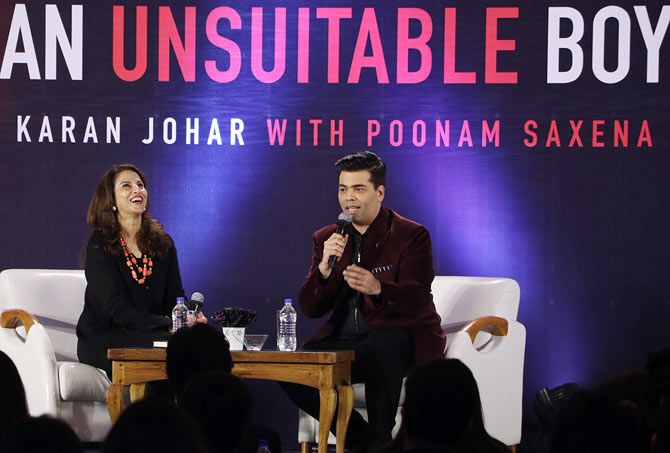
Photograph: Hitesh Harisinghani/Rediff.com
They might, for example, bring on a procession of book tours and promotions for an Amitav Ghosh or a William Dalrymple or for a Rishi Kapoor autobiography that will sell like hot cakes anyway than pump money into launching a promising unknown.
Obviously, this further reduces the chances of there being more breakout new authors -- not just in commercial fiction but across genres like literary fiction, crime and so on.
Mathur of Penguin Random House says her team pushes every author, and marketing plans are tailored to the author with an eye on the readership.
"But we do tell new authors to get online and build their profile. And yes, if a new author becomes a success, it has a lot to do with how much they push their own work and work with our team to enhance their readership."
Even the older, established commercial fiction writers know that they need to market their work aggressively to stay in the game.
Amish, the leader of the mythology fiction pack, whose Meluha trilogy and the latest, Scion of Ikshvaku, have together sold around 3.5 million copies, calls himself a "hardcore sales and marketing guy" when it comes to launching his books.
In fact, Amish was the one who pioneered the concept of teaser book trailers. Even he says: "I think we can learn a lot from these new guys who are using social media so well."
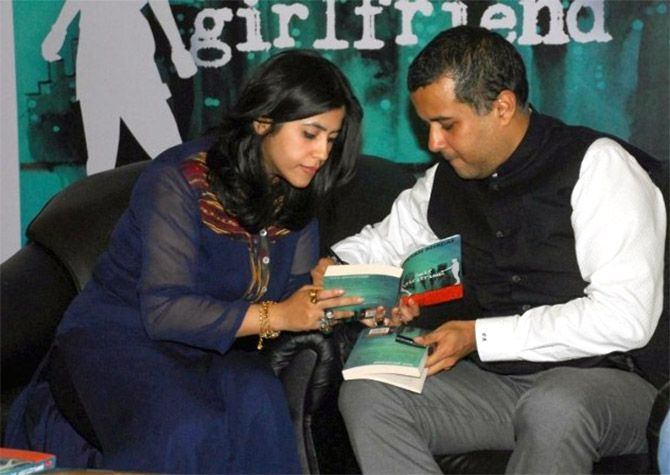
Chetan Bhagat (7 million books and counting) has attained such a stratospheric position that perhaps his books sell themselves, give or take a well-timed controversy.
But other mass market stars such as Ravinder Singh or Durjoy Datta, who sell above 100,000 copies a year, admit that social media marketing is essential because that's the best way to keep in touch with the young readership.
Datta, who famously proposed on Twitter last year, says ruefully that he doesn't do the social media thing too well. "I know it’s important, but it doesn’t come to me very naturally."
Singh, on the other hand, was an early adopter of the medium -- he was promoting his first book, I Too Had a Love Story on Orkut and Facebook way back in 2008.
Singh sees himself as an entrepreneur, his books as a "venture" from which he would like to make a profit for himself and his publisher.
Tellingly, he calls a book a combination of innovation (writing) and marketing, and is completely invested in the process of creating a buzz around his works.
Though no one will say it on record, there are whispers in the publishing world today that there's often a seamy side to the 'bestseller' tag.
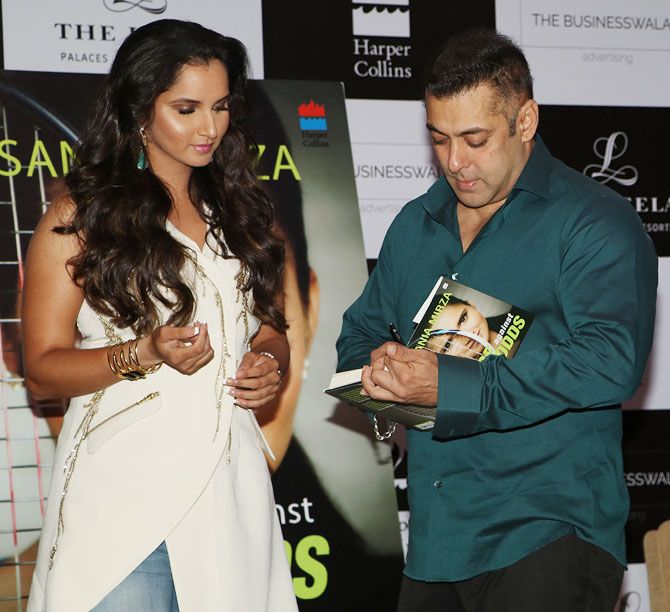
Photograph: Hitesh Harisinghani/Rediff.com
There is talk of paid online reviews, of writers who buy their own books and then place them back in the distribution network to boost sales figures, of putting the bestseller label on the cover of their books when they are not so.
"It's like Bollywood's Rs 100 crore club," jokes Juggernaut's head of business development, Anish Chandy. "You can simply call yourself a bestseller."
Needless to say, publishers everywhere are hungry for bestsellers.
In India, though, says Gupta of Writer's Side, "nothing is doing really well except some mass market fiction, books by marquee authors or celebrity memoirs. A good literary fiction by a new author rarely manages to sell more than a few thousand copies."
Hachette India Managing Director Thomas Abraham goes a step further. "I would say all categories are struggling equally," he says.
"The most visible titles that make it big are but the tip of the iceberg. For every one mass market hit, celebrity memoir, marquee name or a new offering that clicks, there are nine that fail."
That makes the achievement of writers like Sharma and Pandey all the more spectacular.
Of course, every few years one or two writers come along who find a sweet spot in the mass market segment.
But as Sharma and Pandey have shown, in today's day and age, to become a runaway bestseller you also need to be social media star.
DON'T MISS reading the features in the RELATED LINKS below...











